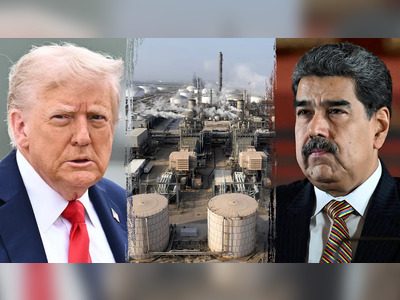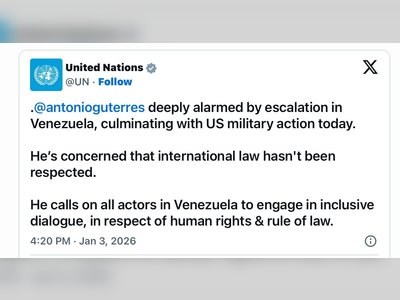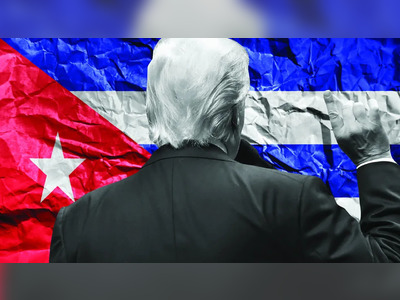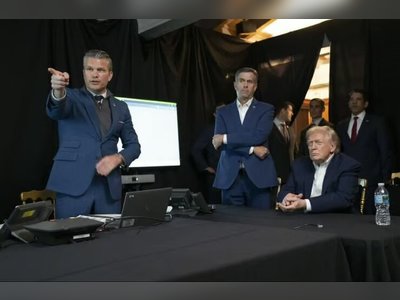
Germany's Parliament Faces Criticism from Opposition Over U.S. Tariffs
Calls for an urgent parliamentary session highlight divisions within Germany's political landscape regarding trade policies.
Germany's political scene is experiencing heightened tension as various factions within the Bundestag demand urgent discussions regarding the impact of U.S. tariffs on German trade.
The calls for an emergency session come in response to tariff policies enacted by the United States during the administration of former President Donald Trump, which have created significant pressures on Germany’s economy.
Political groups including the Alternative for Germany (AfD) and the Left Party have been at the forefront, advocating for an immediate parliamentary meeting to deliberate on the repercussions of these trade measures.
The Green Party has also expressed support for convening a session, emphasizing the necessity for the government to take decisive action against the economic challenges arising from the tariffs.
Despite these pleas from the opposition, the ruling coalition, comprised of the Christian Democratic Union (CDU) and the Social Democratic Party (SPD), has opted against holding a special session, drawing criticism from legislators who contend that the escalating situation necessitates prompt legislative engagement.
This refusal to convene has prompted questions regarding the coalition's ability to effectively address both domestic and international economic challenges over the upcoming four years.
As trade issues gain prominence, the coalition's stance on this matter may significantly shape public discourse and political dynamics in Germany, particularly with forthcoming economic negotiations and broader relations between the European Union and the United States in mind.
The ongoing tariff dispute introduces further complications to Germany's economic climate, which is already navigating the aftermath of the COVID-19 pandemic along with persistent geopolitical tensions.
With European economies striving for recovery, the domestic political strategies surrounding U.S. tariffs illuminate the complexities of governance amidst global economic uncertainties.
The calls for an emergency session come in response to tariff policies enacted by the United States during the administration of former President Donald Trump, which have created significant pressures on Germany’s economy.
Political groups including the Alternative for Germany (AfD) and the Left Party have been at the forefront, advocating for an immediate parliamentary meeting to deliberate on the repercussions of these trade measures.
The Green Party has also expressed support for convening a session, emphasizing the necessity for the government to take decisive action against the economic challenges arising from the tariffs.
Despite these pleas from the opposition, the ruling coalition, comprised of the Christian Democratic Union (CDU) and the Social Democratic Party (SPD), has opted against holding a special session, drawing criticism from legislators who contend that the escalating situation necessitates prompt legislative engagement.
This refusal to convene has prompted questions regarding the coalition's ability to effectively address both domestic and international economic challenges over the upcoming four years.
As trade issues gain prominence, the coalition's stance on this matter may significantly shape public discourse and political dynamics in Germany, particularly with forthcoming economic negotiations and broader relations between the European Union and the United States in mind.
The ongoing tariff dispute introduces further complications to Germany's economic climate, which is already navigating the aftermath of the COVID-19 pandemic along with persistent geopolitical tensions.
With European economies striving for recovery, the domestic political strategies surrounding U.S. tariffs illuminate the complexities of governance amidst global economic uncertainties.
AI Disclaimer: An advanced artificial intelligence (AI) system generated the content of this page on its own. This innovative technology conducts extensive research from a variety of reliable sources, performs rigorous fact-checking and verification, cleans up and balances biased or manipulated content, and presents a minimal factual summary that is just enough yet essential for you to function as an informed and educated citizen. Please keep in mind, however, that this system is an evolving technology, and as a result, the article may contain accidental inaccuracies or errors. We urge you to help us improve our site by reporting any inaccuracies you find using the "Contact Us" link at the bottom of this page. Your helpful feedback helps us improve our system and deliver more precise content. When you find an article of interest here, please look for the full and extensive coverage of this topic in traditional news sources, as they are written by professional journalists that we try to support, not replace. We appreciate your understanding and assistance.











